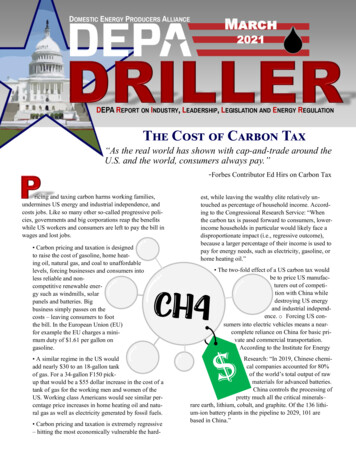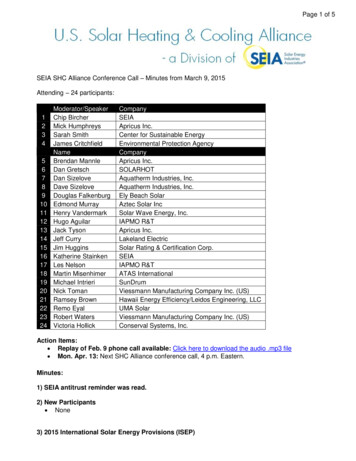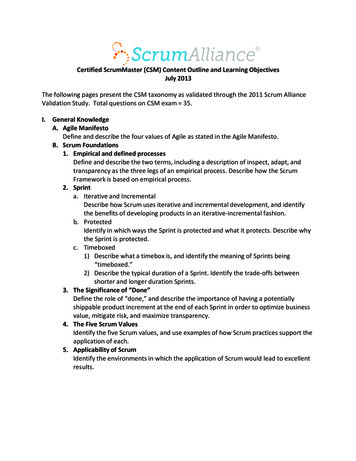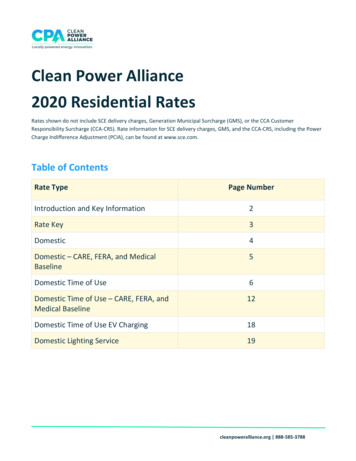
Transcription
DOMESTIC ENERGY PRODUCERS ALLIANCEMarch2021 DEPA REPORT ON INDUSTRY, LEADERSHIP, LEGISLATION AND ENERGY REGULATIONThe Cost of Carbon Tax“As the real world has shown with cap-and-trade around theU.S. and the world, consumers always pay.”-Forbes Contributor Ed Hirs on Carbon Taxricing and taxing carbon harms working families,undermines US energy and industrial independence, andcosts jobs. Like so many other so-called progressive policies, governments and big corporations reap the benefitswhile US workers and consumers are left to pay the bill inwages and lost jobs. Carbon pricing and taxation is designedto raise the cost of gasoline, home heating oil, natural gas, and coal to unaffordablelevels, forcing businesses and consumers intoless reliable and noncompetitive renewable energy such as windmills, solarpanels and batteries. Bigbusiness simply passes on thecosts – leaving consumers to footthe bill. In the European Union (EU)for example the EU charges a minimum duty of 1.61 per gallon ongasoline. A similar regime in the US wouldadd nearly 30 to an 18-gallon tankof gas. For a 34-gallon F150 pickup that would be a 55 dollar increase in the cost of atank of gas for the working men and women of theUS. Working class Americans would see similar percentage price increases in home heating oil and natural gas as well as electricity generated by fossil fuels. Carbon pricing and taxation is extremely regressive– hitting the most economically vulnerable the hard-est, while leaving the wealthy elite relatively untouched as percentage of household income. According to the Congressional Research Service: “Whenthe carbon tax is passed forward to consumers, lowerincome households in particular would likely face adisproportionate impact (i.e., regressive outcome),because a larger percentage of their income is used topay for energy needs, such as electricity, gasoline, orhome heating oil.” The two-fold effect of a US carbon tax wouldbe to price US manufacturers out of competition with China whiledestroying US energyand industrial independence. o Forcing US consumers into electric vehicles means a nearcomplete reliance on China for basic private and commercial transportation.According to the Institute for EnergyResearch: “In 2019, Chinese chemical companies accounted for 80%of the world’s total output of rawmaterials for advanced batteries.China controls the processing ofpretty much all the critical minerals–rare earth, lithium, cobalt, and graphite. Of the 136 lithium-ion battery plants in the pipeline to 2029, 101 arebased in China.”
o According to the Energy Information Agency (EIA)fossil fuels provide 63% of the electricity for US economy. With nuclear providing 20 percent. All renewablescombined account for only 18% of electricity generation in the US.o This tax on US manufacturing would hit particularlyhard in the industrial mid-west. As noted by the YaleClimate Connection: “The burden might be unevenlydistributed regionally, too, and workers in states withenergy-intensive industries such as Ohio, Illinois, Michigan and West Virginia could be harder hit.”o Carbon pricing and taxation would completely gutthe ability to compete against China and render it impossible to re-shore and rebuild the US manufacturingbase. US manufacturing will go the way of Europe.Due to the US shale revolution in oil and gas production, America has reduced carbon emissions morethan any other country on the planet. Look at countrieslike China and India – the world’s first and fourth biggest emitters. They are on track to have higher emissions in 2030 than today. Until we are honest with ourselves and point to the real polluters of the world – suchas the countries with the 300 coal power plants underconstruction – no real progress will be made.DEPA supports a strong environmental policy that isfounded on truth and science, not PR stunts and specialinterests with an aim to only benefit foreign energy production. We strongly urge Congress and those tradeassociations who have lost sight of reality to gain acomprehensive understanding of the devastation a carbon tax would have on all Americans."The easiest way to get societies to authorize the spending of tens of trillions we don’t have is to scareus. The academic and activist faction that sets the threatening tone in the climate conversation wantdissent eliminated, leaving themselves the only ones authorized to tell you how scared you should be.To avoid wasting trillions, we should not let them."- Bjorn Lomborg, Copenhagen ConsensusBoard of Director’s MeetingNote Date Change: Thursday, April 22, 2:00 pm CDTExecutive Board of DirectorsHarold HammChairmanJerry SimmonsPresident/CEODon MontgomeryVice PresidentBerry MullennixSecretary/TreasurerPO Box 33190Dan BorenStephanie CanalesDiana ChanceEd CrossRon NessJohn SchmitzBen ShepperdBrook SimmonsBill StevensRock Zierman Tulsa, OK 74153DEPA StaffPeter ReganCongressional andAlliance LiaisonDavid CraneLobbyistDEPA believes in seekingcommon ground, throughcommon sense solutions, tothe challenges facing ourindustry. Our bipartisanapproach provides auniquely powerful voicefor our members at thestate and national level.Cynthia SimondsMarketing andCommunications Dir.Sarah ReeceAdministrative ServicesManagerOur work is critical.Your support is vital. 405-669-6646 Info@DEPAUSA.org
BoardUpdateWelcomeNew BoardMembersThis month our membership voted on five new potential boardmembers to join us the DEPA Board of Directors officially during theApril 22, 2021 board meeting. We are pleased to welcome them intoour ranks.Each of them brings to the board different qualities that make ourorganization more robust and more effective.As always, we are grateful to the professionals that volunteer theirtime and talent to the DEPA mission.DEPA Report on Industry, Leadership, Legislation, and Energy RegulationMarch 20213
M EMBER SPOTLIGHT ON OUR NEW D IRECTORSBillLanceBill G. Lance, Jr. is the Secretary of Commerce for theChickasaw Nation and is responsible for the management of allcommercial business enterprises of the Chickasaw Nation. TheChickasaw Nation Department of Commerce has approximately7,000 employees and is comprised of more than 60 gaming,hospitality, retail, media, manufacturing, and tourism relatedbusinesses.In addition to his role as Secretary of the Commerce Department, Bill also serves on the board of directors for several otherbusinesses owned by the Chickasaw Nation, including GlobalGaming Solutions, LLC (GGS); Sovereign Native Holdco, LLC(SNH) and related subsidiaries; and Chickasaw Nation Industries, Inc. (CNI). GGS operates Remington Park in OklahomaCity, Lone Star Park in the Dallas/Ft. Worth Metroplex, andprovides consulting and management services in the tribal andcommercial gaming industries. SNH is a holding company thatincludes investments in residential and commercial real estate,pharmaceuticals, healthcare, energy and mineral holdings, andother industries. CNI is a holding company that includes subsidiaries focused on government contracting, industrial filtration, network services, research and development, testing andevaluation. CNI has offices and operations in twelve statesacross the United States.Bill serves as a Chickasaw Nation delegate on the ExecutiveCommittee of the American Gaming Association (AGA), National Indian Gaming Association (NIGA), Oklahoma IndianGaming Association (OIGA), and the Inter-Tribal Council ofthe Five Civilized Tribes (ITC). He is a member of the Boardof Trustees for both the University of Oklahoma Foundation andthe Chickasaw Foundation. He also serves on BancFirst Boardof Directors, and the Oklahoma Department of Commerce Advisory Council.Prior to his current role, Bill served as Administrator of theChickasaw Nation Health System, where he oversaw the historic construction of the 370,000 square foot Chickasaw NationMedical Center, located in Ada, Oklahoma.4 Domestic Energy Producers AllianceBill received a Master of Public Health degree from the University of Oklahoma, College of Public Health, Bachelor ofScience degree from East Central University, and a Fellow ofthe American College of Healthcare Executives. He is also agraduate of Leadership Oklahoma class XXV.Bill currently holds licenses in good standing with the Chickasaw Nation Gaming Commission, Oklahoma Horse RacingCommission, and Texas Racing Commission.Bill is a fifth generation Oklahoman and a proud member ofthe Chickasaw Nation.Bill makes his home in Sulphur, Oklahoma where he enjoysspending time with his wife Sherri, their daughter, two sons,daughter-in-law and grandchildren.
JohnMcNabbJohn McNabb is the lead director of Continental Resourceshaving served on the Continental board since 2010. He isalso a director of Cypress Environmental Partners. Bothcompanies are listed on the New York Stock Exchange. Prior thereto he was Chairman and Chief ExecutiveOfficer of Willbros Group, a multi-billion dollar international energy contractor which worked in sixty countries over itsone hundred year history. He also served as Vice Chairmanof Investment Banking at Duff and Phelps an internationalfinancial services and advisory firm. Mr. McNabb has servedon the boards of directors of eight publicly listed companiesalmost consecutively during the past thirty years and overfifty private company and non-profit entity boards of directors.With Harold Hamm he co-founded the Trump LeadershipCouncil and later served as Vice Chairman of the AmericanLeadership Council. Mr. McNabb was recently awarded aPresidential Appointment to join the United States HolocaustMemorial Museum Council (Board of Visitors) by PresidentDonald J. Trump. Mr. McNabb serves as Co-Chair of theCouncil for a Secure America, is President of the John andDarlene McNabb Charitable Foundation and is Chairman ofthe Free Press Foundation. He is an emeritus member of theFuqua School of Business board of visitors at Duke University and formerly served as Chairman of the Board of Visitors at the University of Houston where he lectured as anExecutive Professor of Finance. He co-founded Growth Capital Partners and served in the roles of Chairman and ChiefExecutive Officer. He began his forty year energy careerwith Mobil Oil Corporation.He served in the United States Air Force in Southeast Asiaduring 1969-1972 and served at Takhli RTAFB and KoratRTAFB. He was a member of the 355th and 388th FighterWings advancing to the rank of Captain and was awarded theAir Force Commendation Medal, the Air Medal with threeoak leaf clusters and the Distinguished Flying Cross. He wasa finalist for the 1970 Pacific Air Force Junior Officer of theYear award.Mr McNabb has two degrees from Duke University and wasnamed to the All Atlantic Coast Conference team and twoAll America teams during the 1965 college football season.He and his wife Darlene manage their charitable foundation'sbusiness from their home in Colorado.DEPA Report on Industry, Leadership, Legislation, and Energy RegulationMarch 20215
M EMBER SPOTLIGHT ON OUR NEW D IRECTORSTimMunizMr. Muniz has served as Chief Executive Officer ofImpact Exploration and Production, LLC since February2017. Impact is an operator in the Powder River Basinwith assets covering over 70,000 net acres in ConverseCounty, WY.Prior to founding Impact, Mr. Muniz was the Vice President of Operations for Centennial Resource Developmentfrom inception of the company in July 2013 through theacquisition by the Silver Run Spac in October 2016. Mr.Muniz managed all operations for CDEV in the DelawareBasin with just over 42,000 net acres. Just prior to joiningCentennial Mr. Muniz started Mega Operating, a Rockiesfocused consulting firm, in March of 2013. Mega Operating’s focus areas were the DJ and Williston Basins withover 20 field consultants. Mega Operating continued as asuccessful consulting company until 2017 when the decision was made to shift 100% focus towards Impact and thePowder River Basin.In 2007 Mr. Muniz joined GeoResources/G3 Operatingand was the VP of Operations for the Northern Divisionthat included operations in CO, KS, MT and primarily ND.Through grassroots leasing G3 Operating amassed an additional 60,000 net contiguous acres in the Bakken play ofWilliams County, ND in 2009. Mr. Muniz managed a 3-rigdrilling program in the Williston basin prior to being acquired by Halcon Resources in August of 2012. This program included building out full infrastructure (little to noprevious activity over the acreage) such as electrical, midstream, owned/operated SWD sites and freshwater wells/pipelines.6 Domestic Energy Producers AllianceFrom 2005-2007 Mr. Muniz started up a Denver officefor Texas American Resources to serve as the OperationsManager for a newly acquired DJ Basin asset. Responsibilities included surface land negotiations, land surveying,permitting, construction, drilling (2 rig program), completion, production, marketing, and workover activities toname a few. Prior to joining the upstream side of the business Mr. Muniz started in 2001 with Halliburton EnergyServices as a field engineer and prior to leaving was theDistrict Field Engineer for the Brighton, CO office servicing the DJ Basin.Mr. Muniz is also a board member with the PetroleumAssociation of Wyoming (PAW) which continues to be asignificant voice for oil and gas companies working in Wyoming. Mr. Muniz and Impact are very excited to be a newmember of DEPA as he is looking forward to a strong involvement with all the committees/current members withcontinued effort to be a powerful voice/advocate for ouramazing industry that is crucial to the American way of life.
Pete ObermuellerPete Obermueller is President of the Petroleum Association of Wyoming, a post he has held since January of2019. As President, Pete represents Wyoming’s oil andgas industry at the local, state and federal level. A graduate of Natrona County High School in Casper, Wyoming, Obermueller holds a Master Degree in Public Policy from the University ofMinnesota. Following several years of serving Wyoming in Washington D.C. as an aide to former United States Representatives Barbara Cubin and Cynthia Lummis, Pete moved back to Wyoming in2013 to head up the Wyoming County Commissioners Associationbefore taking the helm at the Petroleum Association. Pete enjoys agood cup of coffee, a nice bourbon, running, backpacking, andspending time with his wife and two daughters.VigneshProddaturiVignesh focuses on asset management, evaluations and business development at Glendale. Prior to co-founding Glendale, Vignesh wasa Partner at Millennial Energy Partners where he led Millennial’sentry into the STACK play and helped secure significant private equity investments leading to direct participation in the acquisition anddrilling across most major unconventional plays in the US. Previously, he was Head of Reserves at Legend Natural Gasand a key member of the team involved in the merger of Legend and KKR Natural Resources. Prior to Legend, Vigneshwas the Manager of Reserves and Economics at Seneca Resources and was the Reservoir Engineering Manager at bothMilagro Exploration and Sabco Oil and Gas. He started his oil and gas career at Intertek Westport as a Petroleum Engineer performing special core analysis. Vignesh earned a B.S. in Mechanical Engineering from Osmania University, anM.S. in Petroleum Engineering from New Mexico Tech and a M.B.A. with specialization in Energy Investment and Finance from the University of Houston. He is a Registered Professional Engineer in the State of Texas and was namedone of Oil & Gas Investor’s Top 30 Under 40 Leaders in 2015.DEPA Report on Industry, Leadership, Legislation, and Energy RegulationMarch 20217
B o a r d o f D i r e c to r sExecutiveCommitteeDirectorsHarold HammJerry SimmonsDon MontgomeryBerry MullennixDan BorenStephanie CanalesDiana ChanceEd CrossRon NessJohn SchmitzBen ShepperdBrook SimmonsBill StevensRock ZiermanChairman, Continental Resources Inc.President/CEO, DEPAVice President, Montgomery ExplorationSecretary/Treasurer, Panther Energy, LLCDirector, First United BankDirector, Cougar Drilling SolutionsDirector, Donner PropertiesDirector, Kansas Independent O&G AssociationDirector, North Dakota Petroleum CouncilDirector, B29 InvestmentsDirector, Permian Basin Petroleum AssociationDirector, The Petroleum Alliance of OklahomaDirector, WindRiver Associates, LLCDirector, CIPABobby Baggett, Valeo Capital Advisors, LLCPatrick Montalban, Northern Montana Oil & Gas Assoc.Joe Gorder, Valero EnergyTBA, SPN Well ServicesJason Geer, Michigan Oil & Gas AssociationRick Muncrief, Devon EnergyThomas Herbert, Florida Indep. Petroleum Producers Assoc.Tim Muniz, Impact Exploration and Production, LLCBlu Hulsey, Continental Resources, Inc.Pete Obermueller, Petroleum Association of WyomingKenny Jordan, Assoc. of Energy Service CompaniesVignesh Proddaturi, Glendale CapitalRoger Kelley, Continental Resources, Inc.Greg Schnacke, Denbury Inc.Bill Lance, Chickasaw NationAvery Smith, JP Consultants, LLCDavid Le Norman, Reign Capital HoldingsJudy Stark, Panhandle Producers & Royalty Owners Assoc.Toby Mack, Energy Equipment & Infrastructure AllianceRobert Stewart, Illinois Oil & Gas AssociationMike McDonald, Triad Energy, IncJennifer Sutton, Council for a Secure AmericaJeff McDougall, JMA Energy Company, LLCJim Teague, Enterprise Partners, LLCJohn McNabb, Cypress Environmental PartnersFred Toney, Calfrac Well Services Ltd.Mark Metzler, Felderhoff ExplorationDarlene Wallace, Columbus OilJason Modglin, Texas Alliance of Energy ProducersBob Warren, International Assoc. of Drilling ContractorsNelson Wood, Wood Energy, Inc.8 Domestic Energy Producers Alliance
Stop Calling It a SubsidyPercentage Depletion Under AttackPlease pass this information on to those who needto be educated about what Percentage Depletionand IDCs are, and why they are important to theoil and gas industry.Description of Current Tax ExpenditureDescription of Current Tax ExpenditureTitle of Tax Expenditure: Excess of percentage overcost depletion, fuels (oil and gas)Title of Tax Expenditure:Expensing of exploration and development costs,fuels (oil and gas)Function: EnergyEstimated Cost (2018-2022): 2.3 billionInternal Revenue Code Section: Secs. 613 and 613ADescription of Current Law:Depletion is available to any person having an economicinterest in a producing oil and gas property. There aregenerally two types of depletion – cost and percentagedepletion. Cost depletion is limited to the taxpayer’s basisin the property, whereas percentage depletion is not limited by the basis but is subject to limitations on net income derived from the property and taxable income.Percentage depletion for producing oil and gas property(15 percent rate) is available only to independent producers and royalty owners. Special rules apply to oil and gasproduction from marginal wells (generally, wells forwhich the average daily production is less than 15 barrelsof oil or barrel-of-oil equivalents or that produce onlyheavy oil). In no event may the rate of percentage depletion exceed 25% for any taxable year.Also, perhaps most notably, percentage depletion is limited the first 1,000 barrels of oil (or equivalent) of dailyproduction, some many larger independents receive thistax treatment for only a small percentage of their production.Function: EnergyEstimated Cost (2017-2021): 6.2 billionInternal Revenue Code Section: Sec. 263(c)Description of Current Law:Federal law provides special rules for the treatment of intangible drilling and development costs (IDCs). Underthese rules, an operator or working interest owner whopays or incurs IDCs in the development of an oil or gasproperty in the United States may elect either to expenseor capitalize those costs. If an election to expense IDCs ismade, the taxpayer deducts the amount of the IDCs as anexpense in the taxable year the cost is paid or incurred.IDCs include all expenditures made by an operator forwages, fuel, repairs, hauling supp
Mar 04, 2021 · Chickasaw Nation and is responsible for the management of all commercial business enterprises of the Chickasaw Nation. The Chickasaw Nation Department of Commerce has approximately 7,000 employees and is comprised of more than 60 gaming, hospitality, reta











